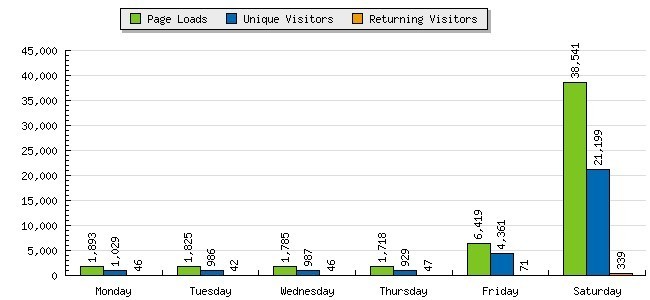
Most bloggers blog away, and slowly — over time — build up their readership. They are rocking along on a hosting company pretty much like everyone else’s and not giving much thought to bandwidth or page views.
Oh sure, we all want more, I mean who doesn’t want more page views? But what happens to your site if suddenly, with no warning — 30 thousand people show up? It can happen if you land on the front page of Digg. That’s right… just one great blog post that goes viral, and they could literally be beating down your virtual door.
If your site is setup like most blogs using your average hosting companies… your site might not survive the day. It could come to a screeching halt 30 seconds into your 15 minutes of fame.
While it true that a blog is software running on the web, accessing records in a database (your posts and pages), there is something you can do to ensure you survive a Digg.
It’s a process called “Caching Your Site“, and it involves reading the page, creating a *cached* version of it, and serving that to new visitors. When a page changes (new content or updates to an existing page), the cache is refreshed. (Okay, I know it’s boring stuff, please don’t write in to tell me that)
A normal blog will take 40 – 70 database “reads” to build the home page, depending on the theme and special features. Imagine that happening a hundred times a second. It’s enough to melt a server.
So, the obvious goal here is to create *cached* pages for often viewed content and serve those pages to visitors.
There are plugins that will make this pretty much painless to do. Simply edit your wp-config.php file with notepad or an HTML editor to include the line shown below and install one of the plugins listed. That’s it.

(Be sure to upload your changes to your domain)
My personal favorite, this is the one I am running on several blogs. It’s pretty much set it and forget it, which I really like. Click the link above to read more about it, or to download the plugin. If you are using Plugin Central, you can simply copy the Hyper Cache Download Link here (right click and select Copy Link Location) and paste it into Plugin Central.
This plugin generates static html files from your dynamic WordPress blog. After a html file is generated your webserver will serve that file instead of processing the comparatively heavier and more expensive WordPress PHP scripts. WP Super Cache Download Link.
The caching plugins show above cache the page part of the blog. This plugin caches the widget part of the page. This plugin is highly customizable and will allow you to NOT cache some widgets (that display dynamic information that changes frequently (for example). WP Widget Cache Download Link
One other note…although I used Digg in this example, any social site like Twitter or Facebook can create the same problem for you. All it takes it a really great (read viral) post that gets *talked about*.
[Disclaimer: Even with cached pages, if your content is really really good and gets talked about on all the social networks, you still might melt your servers. This blog post does not consitute any type of guarantee against the aforementioned server melt down.]